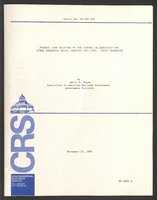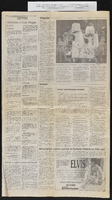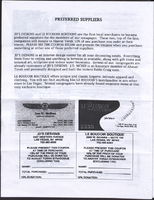Search the Special Collections and Archives Portal
Search Results

Transcript of interview with Barbara Agonia by Suzanne Becker, September 17, 2007, September 25, 2010, & October 2, 2007
Date
Archival Collection
Description
When Barbara Agonia arrived in Las Vegas in 1969 to pursue a Master's Degree in English, the University of Nevada Las Vegas was barely ten years old and the population of Las Vegas was just approaching 160,000 residents. At the time, she was 35 years-old and it was a decision and move that would forever change her life and higher education in Clark County. Barbara Agonia was born in St. Louis, Missouri, in 1934 to Robert Lewis Klinefelter and Suzanne Carter Klinefelter. At the time of Barbara's birth, her father worked for Brown Shoe Company in St. Louis. The family moved to Bunker Hill, Illinois when Barbara was still an infant. This was Mr. Klinefelter's hometown where a portion of the extended family still resided. In the late 1930s, Mr. Klinefelter got a job in a brass mill near Alton, Illinois, and he commuted there daily. When the United States entered World War II, Mr. Klinefelter tried to enlist in the army, but was rejected because he had two small children and because he worked in an essential industry. He decided to work in a non-essential industry and took a job at Montgomery Ward in Oak Park, Illinois. Barbara was in the third grade that year. Still unable to enlist, Mr. Klinefelter moved the family to Wabash, Indiana, and began working for General Tire in 1943. They moved to Logansport, Indiana in 1947. Agonia recounts that education has always been a significant part of her life, with the importance of a good education stressed in her life from early childhood forward. After graduating from high school in Logansport, Indiana, she attended Hanover College in southern Indiana, enrolling in 1952. Her educational experience at Hanover included a year studying abroad at the University of Exeter in Devonshire, England—an experience which Agonia credits as further cementing her commitment to education and her love of literature and language. She graduated from Hanover in 1957 with a double major in English and speech/ theater. Agonia spent her first years out of college teaching high school English, speech, and theater in west central Illinois and the next eight in northern Illinois. A little over ten years into her career, at the age of 35, she decided to pursue a Master's degree in English. Her sister, Martha, who at the time lived in Las Vegas, suggested checking into programs offered at the city's newly formed university. In 1969, Barbara moved to Las Vegas and enrolled in the English Department at UNLV. As Agonia was completing her degree in 1971, the community college system in Nevada was emerging and seeking faculty for the up and coming institution. Curious to know more about the new system, Agonia scheduled a meeting with the person in charge of hiring. Two hours later, she walked out with a contract in her hand, one of eight new faculty members at Clark County Community College, now known as College of Southern Nevada. In her early years with the college, Agonia did a great deal of public speaking on behalf on the newly formed system, promoting the new institution and reaching out to potential students. At the same time, she taught full course loads in composition and literature, and eventually became chair of the English department. Her new position and public speaking work on behalf of the college not only provided her contact with the local Las Vegas community, it ultimately became the catalyst in spurring her passion for community involvement, particularly working on behalf of women within the community. • • Vll As the 1980s approached, Agonia became actively involved in rape crisis education, at the urging of Florence McClure. Then, in 1980, Agonia was again in on the ground floor of community programming, when she and Beverly Funk, at the urging of Judith Eaton, the president of Clark County Community College, established a Women's Center on campus. The Center was initially set up to help women in a variety of life circumstances, including women who were wanting to return to school or who were new to the process of school altogether. The center eventually became the Re-Entry Center offering skill development, tutoring programs, and other forms of assistance for anyone interested in returning to school. In addition to her involvement in and commitment to public education, Agonia has also been involved in the Soroptimist International organization for business and professional women who work to improve the lives of women and girls in local and international communities. In the Las Vegas area, Soroptimist International of Greater Las Vegas worked to establish the Rape Crisis Center and the Center for Domestic Violence, which later became SafeNest. Agonia has been working with the organization since 1982. Through Soroptimist International, she also became involved in Friends of the Nevada Wilderness, an organization devoted to designation and long-term protection of Nevada's wilderness areas. As the representative for Soroptimist International, she traveled to Washington to lobby and testify in front of the senate for the establishment of Great Basin National Park. Agonia's work in the Las Vegas community over the past forty years has been significant. She counts Florence McClure, Geneva Douglas, and Jean Ford amongst her greatest influences. As she notes in her oral history, "I learned how to be radical from those women." She happily embraces the label of radical. This attitude surfaces throughout Agonia's experiences and recollections, and underscores her work and dedication to the interplay of local education and women's issues within Nevada.
Text

Dr. Alvaro Vergara-Mery oral history interview: transcript
Date
Archival Collection
Description
Oral history interview with Dr. Alvaro Vergara-Mery conducted by Barbara Tabach on October 28, 2020 for the Latinx Voices of Southern Nevada Oral History Project. Alvaro discusses his personal history and his upbringing in both Chile and the United Kingdom before immigrating to the United States; due to political unrest in Chile, he moved to the U.K. where his mother was born before attending university in the United States. Alvaro talks about his work as a medical interpreter for University Medical Center (UMC) as well as his college teaching experience at University of Nevada Las Vegas and California State Berkley.
Text

Dr. Linda K. Miller oral history interview: transcript
Date
Archival Collection
Description
Oral history interview with Dr. Linda K. Miller conducted by Claytee D. White on July 10, 2019 for Boyer Early Las Vegas Oral History Project. In this interview, Dr. Miller discusses her early life in Kansas City, Kansas and arriving to Las Vegas, Nevada in 2002. She talks about Helen J. Stewart, the Old Mormon Fort, and the significance of that area. Later, Dr. Miller explains the importance of teaching local history to people in Las Vegas. Lastly, Dr. Miller discusses the process of writing a book about Helen J. Stewart.
Text

Drug laws: reports, analysis, House Resolution 5484, status, correspondence, clippings, press release, statement from Senator Hecht, and notes
Date
Archival Collection
Description
Folder of documents from the Senator Chic Hecht Political Papers (MS-00003) -- Subject Files -- Judiciary file.
Text

Nery Martinez interview, December 6, 2018: transcript
Date
Description
Interviewed by Laurents Bañuelos-Benitez. Nery Martinez was born in El Salvador, he describes his childhood as one filled with war and violence. When Martinez was five years old, the small country of El Salvador erupted in civil war. Martinez describes the panic that he saw growing up, never being certain when violence could occurred. The 12 year war took up the entirety of Martinez's childhood. After the war, the country was left in runes, seeing little hope for recovery, Martinez left El Salvador for Las Vegas where his brothers had fled earlier during the war. In Las Vegas, Martinez was able to find work in the service industry, at the same time attending English classes at night. Martinez is currently working as a bartender within the Culinary Union. Interview conducted in Spanish.
Text

Maila Aganon oral history interview: transcript
Date
Archival Collection
Description
Oral history interview with Maila Aganon conducted by Kristel Peralta, Cecilia Winchell, and Stefani Evans on June 10, 2021 for Reflections: The Las Vegas Asian American and Pacific Islander Oral History Project. Maila Aganon discusses her childhood, family upbringing, and immigration to the United States from the Philippines when she was a college student. She shares how her parents moved to Las Vegas first and Maila followed a decade later, investing in real estate and eventually taking up permanent residence. Maila talks about her employment history with Allstate Insurance, Bank of America, AAA, Caesars Entertainment, and finally Aon as a Senior Vice President. She also shares her thoughts on the growth of Las Vegas and the growth of the Asian community and cultural influence within the city. Subjects discussed include: anti-Asian violence; Filipino grocery stores; Filipino foods; remote work.
Text

Mauricia Baca oral history interview: transcript
Date
Archival Collection
Description
Oral history interview with Mauricia Baca conducted by Claytee D. White on March 7, 2019 for the Remembering 1 October Oral History Project. Mauricia Baca discusses her early life, her education, and her experiences living in New York City, New York before she moved to Las Vegas, Nevada. She also relates her experiences on and after the 1 October mass shooting. Baca relates information on her agency, Get Outdoors Nevada. Baca shares how her agency worked with the City of Las Vegas in the construction and operation of the Healing Garden. Finally, she discusses the book she helped author regarding 1 October.
Text
Clinton Wright Photographs
Identifier
Abstract
The Clinton Wright Photographs (1964-2018) contains black-and-white photographic negatives of various sizes, dating from 1964 to 1971. The images document the Black experience in Las Vegas, Nevada during the 1960s and 1970s, and capture scenes of everyday life in the historic Black neighborhood known as the Westside, social events such as weddings and parties, and events hosted by local churches. The collection also contains a photograph of Clinton Wright from 2017 when he visited the University of Nevada, Las Vegas Special Collections and Archives, and a memorial program for his wife, Joyce Wright, who passed away in 2018.
Archival Collection


